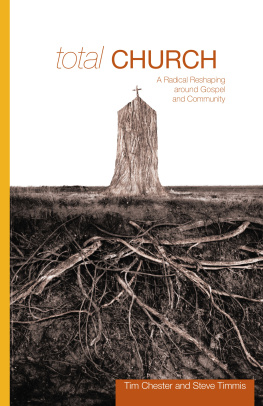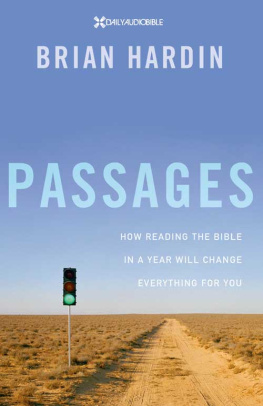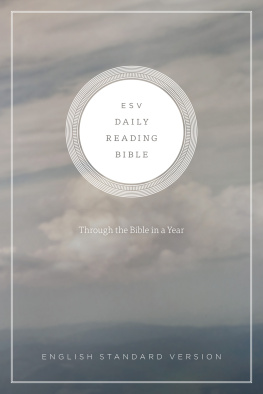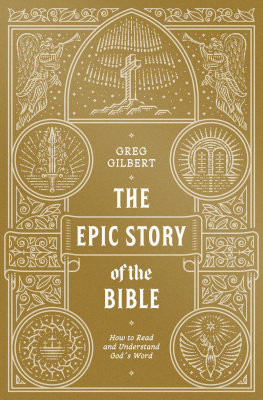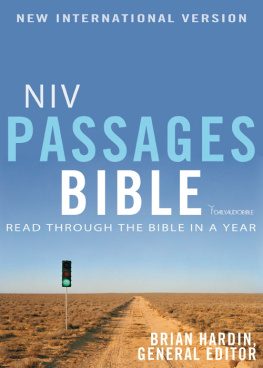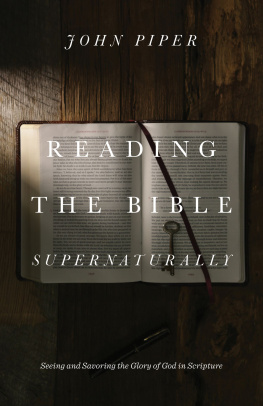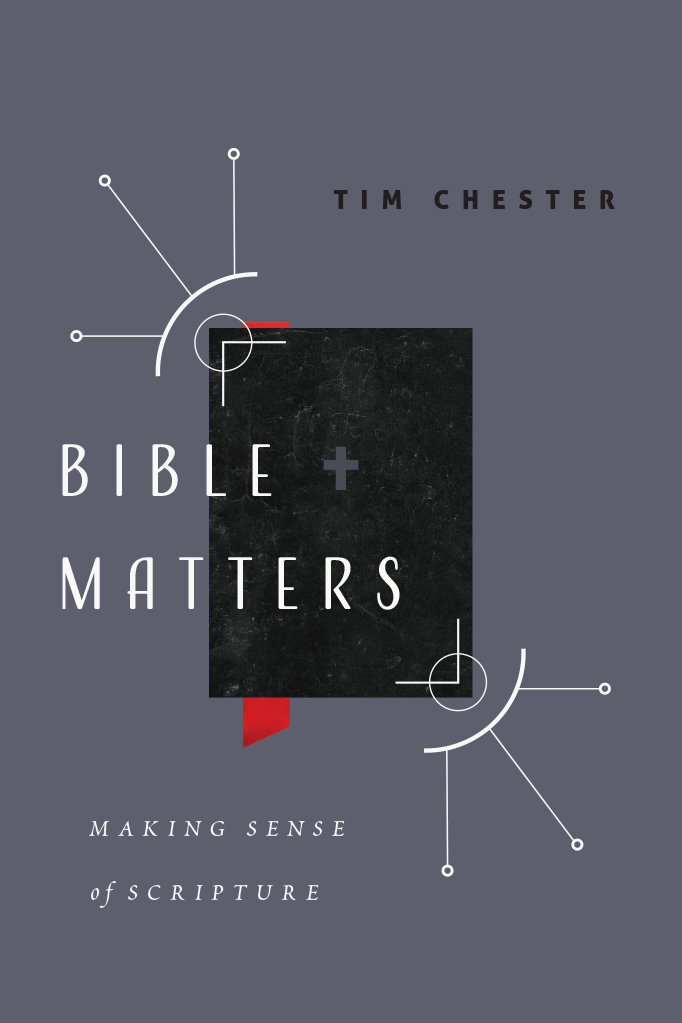Introduction
L et me tell you about an amazing experience I had just this morning. Actually amazing doesnt really do it justice. It was out of this world.
This morning God spoke to me. I know that sounds weird, but Im sure thats what happened. The living God actually spoke to me. I could hear what he was saying just as clearly as you can understand what youre reading now.
The words he spoke felt like words of life to me. They resounded deep in my heart. There were words of instruction that helped me know him more and understand his ways. There were words of challenge that called me to follow him better and love him more. There were words of comfort that spoke to my needs and gave me hope. It was like medicine to my soul. It was like a rousing speech before battle. It was like a love song sung to my heart.
Whats more, what happened to me this morning was not a freaky one-off experience. Its what happens most mornings.
What I did this morning was read my Bible.
At this point you might be feeling like Ive just pulled a fast one on you (unless, of course, you saw it coming a mile off ). You were hoping for a dramatic story, and what you got instead was daily Bible reading. Boring!
My number one aim for this book is this: I want you to realize that every time you read the Bible, youre hearing the voice of Godjust as surely, more surely, than if you have some kind of dramatic experience. I want you to come to the Bible, whether youre hearing it preached on a Sunday morning or reading it on the bus on a Monday morning, with a sense of anticipation and expectancy. Reading the Bible is a dramatic Spirit-filled experience. The God who spoke and brought the universe into existence speaks to you. The God whose voice thundered from Mount Sinai speaks to you. The God in Christ whose words healed the sick speaks to you.
Ive read lots of things about the Bible that Ive agreed with. But very few have captured how I feel about the Bible and why. Thats what Ive tried to do in this book. Its central premise is that the Bible is an intentional book. God gave it to us with a purpose in mind, and that purpose is to enter into, and live in, a relationship with his people. So the Bible is also a relational book. As we read it, we dont merely learn information about Godthough thats certainly true. We hear Gods voice and encounter his presence. This is a book about meeting God in his word.
I read my Bible regularly because I have to. Not have to in the sense that someone might tell me off if I dont or that God will get miffed with me. But have to in the same way that I have to eat food every day. This is how I live. Without Gods word in my life, I too readily get preoccupied with myself, my fears, my insecurities, my reputation. Without Gods word, Im much more vulnerable to temptation. I need Gods word to realign my heart day by day toward Jesus. I need that medicine for the soul, that battle speech, that love song.
1
The God Who Speaks
T ell me about the book youre reading.
Youre only a few words in, but you already know a fair bit about it. You know its about the Biblethe title is a bit of a giveaway. You might remember the author and publisher. You probably read the blurb on the back cover. Maybe you ran your eyes over the contents page. At some point you examined itperhaps in the store when you bought it or when someone gave it to you. If you ordered it online, then maybe you read some customer reviews. You can see it and feel it. Some people like the smell of new books, so you may even have sniffed it... now most of you have. After youve read a couple of chapters youll have an idea whether you like it or not. And if you make it to the end, youll be able to tell other people about it in an informed way.
Its easy to examine a book and find out about it. You can investigate it and interrogate it.
Now, I dont want to alarm you, but there are almost certainly some bacteria on your book. If its any comfort, they were probably transferred onto the book (or ereader) from your hands. Can you tell me about the bacteria on your book? Thats not so straightforward. You cant see, hear, or feel them. Hopefully you cant smell them either, and I dont recommend trying to taste them. Nevertheless, with a powerful microscope or some chemical tests, you could find out something about them. Like a book, theyre susceptible to scrutiny.
What about God? Tell me about God.
You might have all sorts of ideas about God. But what are they based on? You cant see God through a telescope or under a microscope. You cant go and knock on his door to ask him some questions. You cant discover him in the jungle or on the ocean floor. Hes not like other subjects of study. Hes not susceptible to scrutiny.
For one thing, hes a spirit. He has no body and therefore no physical presence. Even more significantly, hes outside our universe. The Large Hadron Collider in Switzerland is the worlds largest machine and largest experiment feeding results into the largest network of computers. The irony of all these superlatives is that its designed to detect the smallest things we know aboutsubatomic particles. Its detecting the aftereffects of particle collisions. But no apparatus could be constructed to find God, because God doesnt exist within our material world. What would our experiment look for? In 2012 the Hadron Collider found evidence for the Higgs boson, a particle that had previously only been postulated. It was nicknamed the God particle. But it wasnt a piece of God or evidence of his existence.
God is beyond our comprehension and outside our field of study. We might postulate his existence as the most likely explanation of effects we can seethings like the complexity of creation or answers to prayer. But we could never prove our hypothesis. We cant stick God under a microscope or in a test tube.
So left to ourselves, we would remain totally in the dark when it comes to God. We have no way of bridging the gap between us and God.
So my request that you tell me about God should be an impossible task. The only way we can ever know anything about him is if he communicates to us. God himself must bridge the gap. We cant study him. But maybe he can talk to us.
And God is not silent.
Knowing God is not completely without parallel in our world. Suppose I said, Tell me about yourself. Heres a subject you do know something about. In fact, arguably youre better informed on this topic than anyone else. The more you tell me about yourself, the more Ill know about you.
But wait a moment. Do you really want to spill the beans to me? After all, weve only just met. Its up to you what you tell me. How much I discover about your dreams, hopes, ideas, beliefs, desires, and plans all depends on how much you tell me. I cant control what information comes my way. Only torturers can force information from people, and even then the reliability of that information is doubtful. In this sense the speaker is sovereign when we communicate.
Its the same with God. We can know about him because he speaks to us. But God remains in control of the process. We talk about grasping an idea. But we dont grasp Godnot even when he reveals himself.
How does God talk to us?
God Talks to Us in Creation
We cant see God. But we can see what hes done. We can see the impact hes made. And we dont have to look very far. Everything that exists points to God. Psalm 19 begins:
The heavens declare the glory of God;
the skies proclaim the work of his hands.
Day after day they pour forth speech;




